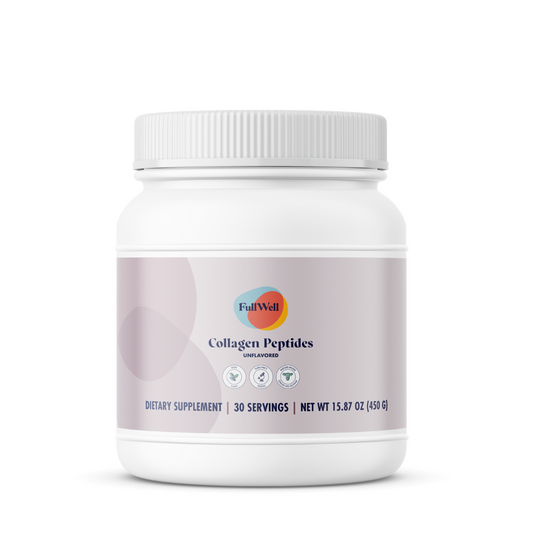Benefits of Collagen for Women
TL;DR
- Collagen starts to decrease in our bodies as we get older, starting as early as our twenties or thirties. Because of this decline, many people find that taking collagen supplements can be beneficial to boost their intake and enjoy the many health benefits that collagen has to offer.
- For overall health, including during and after pregnancy, type 1 and type 3 collagen are especially effective in addressing both general wellness and specific needs related to pregnancy and recovery.*
- Protein plays a crucial role in fertility, pregnancy, and postpartum recovery and collagen supplements can be a great way to ensure you meet your needs.*
- Collagen also contains glycine, one of three key amino acids needed to produce glutathione, a powerful antioxidant that helps protect your cells from damage caused by free radicals. Without enough glycine, your body can’t make as much glutathione, which means it might struggle more with managing oxidative stress over time, and protecting those precious eggs and sperm.*

Collagen loss
Collagen starts to decrease in our bodies as we get older, starting as early as our twenties or thirties (1). After we turn 40, the decrease speeds up, going down by about one percent every year (1). Some research even suggests that by the time we're 80, we may lose up to 75% of our collagen (1)!
Because of this decline, many people find that taking collagen supplements can be beneficial to boost their intake and enjoy the many health benefits that collagen has to offer.
Daily collagen intake
Your body naturally produces collagen, but you can also boost your intake by consuming animal-based foods like bone broth, organ meats, and connective tissues, or through supplements.
Many people have moved away from the traditional "nose to tail" eating approach, which involved using every part of the animal. This shift is due to changes in food production, personal preferences, plant-based diets, and a focus on leaner meats and convenience foods (collagen needs to be slow cooked over a very long period of time to be broken down and absorbed well by the body). As a result, collagen-rich foods, which are excellent sources of glycine—a key amino acid—are consumed less often.
Collagen supplements, typically sourced from beef (bovine) or fish (marine), offer a convenient way to reap these benefits even if your diet lacks collagen-rich foods.
Keep in mind, that there are currently no vegan collagen supplements that can replicate the full range of benefits found in beef or marine sources. Instead, vegan collagen alternatives primarily supply essential building blocks, such as vitamin C, which support your body in producing its own collagen.
How much collagen should I take?
The ideal amount of collagen peptides can vary based on your specific needs—whether it’s for skin health, joint support, or pregnancy and beyond —and the type of collagen peptide you’re using.
While there isn’t a recommended daily amount (RDA) for collagen, taking up to 15 grams of collagen peptides per day is both effective and unlikely to disrupt the balance of essential amino acids in your diet, making it easy to incorporate them into your daily routine (2).
Type 1 and Type 3 Collagens
For overall health, including during and after pregnancy, type 1 and type 3 collagens are especially effective in addressing both general wellness and specific needs related to pregnancy and recovery.*
For more information on everything collagen, check out our blog on choosing the best collagen supplement.
Collagen for fertility
Protein plays a crucial role in fertility, pregnancy, and postpartum recovery and collagen supplements can be a great way to ensure you meet your needs.* Adequate protein intake supports reproductive health by supporting the production of essential hormones and enzymes.*
Collagen also contains glycine, one of three key amino acids needed to produce glutathione, a powerful antioxidant that helps protect your cells from damage caused by free radicals. Without enough glycine, your body can’t make as much glutathione, which means it might struggle more with managing oxidative stress over time (3), and protecting those precious eggs and sperm.*
Collagen for pregnancy
During pregnancy, collagen levels in the uterus increase significantly, roughly 800 percent more than when you're not pregnant (4). After childbirth, about 53 grams of this collagen is lost (4). By the eighth day after delivery, the uterus has already shed about 72 percent of the extra collagen it had during pregnancy (4).
In the second and third trimesters, your protein requirements rise to about 71 grams a day—more than 50% higher than usual. This extra protein is essential for your baby's growth and for producing milk (5). This high demand and rapid decrease of collagen highlight why maintaining adequate protein intake during and after pregnancy is crucial for supporting recovery and overall health.*
Not only does collagen support moms to meet elevated protein requirements during pregnancy and postpartum, but it is crucial during pregnancy because it helps support and strengthen various tissues in your body (6).* It provides the necessary strength and flexibility to the uterus, allowing it to expand as the baby grows, and it helps support the stretching of your abdominal wall.* Additionally, collagen helps keep your skin elastic and resilient, which is important as your body goes through so many changes during pregnancy.*
Collagen for skin
Collagen, frequently celebrated as the cornerstone of skin structure, provides many advantages for overall skin well-being.* Collagen supports skin firmness and elasticity, which are vital for maintaining skin integrity (7, 8, 9, 10, 11, 12).* Collagen also plays a pivotal role in wound healing, promoting tissue regeneration and accelerating the repair process (11).* Additionally, collagen aids in maintaining skin hydration by preserving the skin's moisture barrier (8, 9, 10, 12).*
Collagen for joints
Collagen offers several benefits for joint health, serving as a crucial component of cartilage, tendons, and ligaments. By providing structural support and elasticity to these connective tissues, collagen helps maintain joint function and mobility (1, 13, 14).*
Collagen intake also encourages natural collagen production to support healthy joints during all of life’s stages (1, 13, 14).*
Collagen for muscles
Collagen supports muscle protein synthesis (the process where your body builds new muscle tissue from the proteins you eat, helping your muscles grow and repair), as well as healthy muscle growth (15).*
This is especially beneficial during pregnancy, as it supports your muscle health, helps maintain balance and posture, and assists with carrying the extra weight that comes from growing your new little one.
Collagen for bones
Collagen provides the framework to support overall bone strength and health* (16), in addition to encouraging the repair of micro-damage and helping to maintain healthy bones (17, 14, 18).*
This is particularly important during pregnancy and breastfeeding, as it's normal for bone mineral density to temporarily decline. Research shows that during the first six months of breastfeeding, there can be a 4-6% loss of bone mass due to lower estrogen levels and calcium loss in breastmilk (19).
Collagen Postpartum
Collagen for wound healing
Collagen plays a pivotal role in wound healing, promoting tissue regeneration and accelerating the repair process (11), supporting new moms as they heal postpartum, crucial given that protein requirements for exclusively breastfeeding moms (3-6 months postpartum) is higher than previously thought! Head to Lily Nichols blog for more details!
Collagen while breastfeeding
Collagen provides valuable support for moms during pregnancy and postpartum by helping meet increased protein needs and supporting connective tissues, including in breast tissue. This extra protein is essential for your baby's growth and for producing milk (11).
Glycine for sleep
Many women, though not all, report increased forgetfulness and reduced cognitive functioning during pregnancy. Collagen's main component, glycine, supports restful sleep and daytime cognitive performance, including memory and attention* (20, 21), a must for new moms!
FullWell’s Collagen Peptides
Our collagen peptides are expertly designed with research-backed, sustainably sourced, safe ingredients and obsessively tested through third-party labs to meet the highest standards of quality and safety. We use Type 1 and 3 bovine hide hydrolyzed collagen peptides, a highly bioavailable ingredient, providing 15g of Collagen Peptides per serving, along with 19 naturally occurring amino acids in an easy to take format that can be added to your favorite meal or beverate.
- Pregnancy and Breastfeeding Safe: Safe to consume throughout all stages of life, including during pregnancy, breastfeeding, and beyond.
- Highly Bioavailable Hydrolyzed Collagen Peptides: 15 g of type 1 and 3 collagen per serving for optimal absorption, plus 19 naturally occurring amino acids to support skin, joint, muscle, bone, and cognitive health.*
- Research-Backed Glycine: Each serving provides around 3.5 g of glycine, a key nutrient often missing from modern diets, to help boost collagen production, enhance sleep quality, and support mental clarity throughout the day.*
- Responsibly Sourced and Rigorously Tested: Our 100% pasture-raised, grass-fed and finished bovine hide collagen is independently tested for ingredient accuracy, heavy metals, and top 8 allergens, ensuring it's allergen-free, compliant with Prop 65 standards, and free from unnecessary additives, preservatives, and flavors.
- Convenient: Our unflavored collagen peptides blend seamlessly into any hot or cold beverage or meal, making them easy to enjoy anytime.





